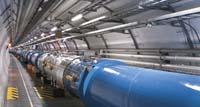ESS-Bilbao to build structures for the Geneva LHC accelerator

ESS-Bilbao and the European Nuclear Research Centre (CERN) agree to build several structures for the Geneva LHC accelerator.
The LHC accelerator is not a single accelerator, but a set of accelerators, one after the other. First of all, the linear accelerator Linac2 emits H- ions to a circular accelerator or proton synchrotron (PS). From there it sends them to the accelerator Super Proton Syncrotron (SPS) and finally to the main accelerator of the LHC, which is a circular tube of about 27 kilometers.
Linac2, SP and SPS accelerators are obsolete and have suffered enormous mechanical demands, corrosion and irradiations, whose reliability depends on the daily maintenance of various elements. Thus, experts at the Geneva facilities have decided to replace these structures. These structures will be replaced by new structures developed with new technologies. In fact, ESS-Bilbao has assumed the supply of this technology. And that same technology will be used in the accelerator they plan to perform at the headquarters of ESS-Bilbao in Leioa.
Thanks to this agreement, the European organization will also provide technology and training to the laboratory staff of the Science Park that is being built at the headquarters of the UPV in Leioa.





